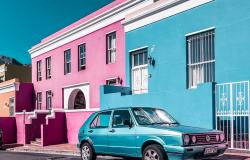Does South Africa have to choose between the US and the BRICS?

The US has never been a fan of some of South Africa’s friends, but with a key trade deal up for renegotiation it might be time for South Africa to choose between the US and its rivals, writes Scott Firsing.
“South Africa has a choice in what partners to prioritise. But so too does the United States,” said US Representative John James in a firm voice during a congressional hearing discussing US-South African bilateral relations on 27 September 2023.
This issue of choosing partners or sides is not new in the US-South Africa relationship. Despite positive diplomatic relations early on between the US and SA, some of South Africa’s “friendships” led to disagreements. In the mid-1990’s Nelson Mandela adopted a “friends toward all” approach to foreign policy. As a result of this policy, Mandela had a lot of friends including Cuba’s Fidel Castro, Palestine’s Yasser Arafat, and Libya’s Muammar Gaddafi, as well as leaders in Russia and Iran, all of whom supported the African National Congress (ANC) in their struggle to overcome Apartheid.
The US did not approve of Mandela’s plans to visit Libya in 1997 but Mandela responded with his infamous finger-wagging retort: “How can they have the arrogance to dictate to us who our friends should be?”
Today, the dispute over friends is largely around South Africa’s current BRICS partners Russia and China. And to a smaller extent, Iran, a soon-to-be BRICS member after being officially invited to join the bloc at the recent BRICS Summit hosted by SA.
South Africa’s history is an important part of its international diplomacy. ANC Cadres recall the support they got, or didn’t get, from certain countries during their fight for freedom. Moscow provided the ANC with money and military training. Thabo Mbeki, Mandela’s deputy president and his successor as president, went to Moscow for military training, chiefly in sabotage work.
When Mandela met Iranian Ayatollah Seyyed Ali Khamenei in 1992, he called him “my leader” and praised the Iranian government and nation for their support of their struggle against apartheid. Mandela further explained how the Islamic revolution was an impeccable example of a successful and valuable fight against oppression. The SA-Iranian diplomatic and economic relationship has expanded since then thanks in part to the strong Joint Commission of Cooperation established in 1995.
In contrast, from the Cold War until 2008, both the US State and Defense departments had Mandela and the ANC on the US terrorism watch list and US President Ronald Reagan supported the Apartheid government.
South Africa’s relationship with China is a bit different. Mandela announced before the end of his presidency in 1999 that he would normalise relations with China, despite Taiwan being a longtime ally and significant foreign investor. Chinese President Xi Jinping asserted that Mandela was “one of the founders of China-South Africa relations.” The Sino-SA relationship has flourished since Mandela’s term and SA has been China’s biggest trading partner in Africa for 13 years in a row.
Washington and Pretoria
US government officials are growing concerned with the ANC’s closer ties to the BRICS alliance, specifically Russia and China. According to Rep. James, “Pretoria [is] actively involving itself in Moscow and Beijing’s effort to de-dollarize the global monetary system and rewrite international norms.” Additionally, South Africa hosted military exercises with Russia and China on the anniversary of Russia’s invasion of Ukraine and has abstained on multiple UN Votes against Russia’s invasion. SA President Cyril Ramaphosa even blamed NATO for the war in Ukraine. In March, during dialogue with the Chinese Communist Party, and not mentioning the US by name, Ramaphosa said “the ANC detested the domination by a single state or its nation’s military, economic power, and social and cultural influence over how the rest of the world ought to conduct itself regarding the recent political developments across the globe.”
In May 2023, the US Ambassador to South Africa, Rueben Brigety accused SA of exporting weapons to Russia via the Russian cargo ship the Lady R that docked at SA’s Simon’s Town Naval Base in December. President Ramaphosa called Brigety’s intervention “disappointing” and “counterproductive,” and said that they undermined a US-SA agreement to investigate the matter. SA Foreign Minister Naledi Pandor also called in Brigety and reprimanded him. Back in Washington, this combination of events led a group of US lawmakers to request moving the upcoming Summit for the African Growth and Opportunity Act (AGOA) out of South Africa.
Good old-fashioned diplomacy has usually been the cure to US-South Africa disagreements and 2023, so far, is no different. The end of September saw Secretary of State Antony Blinken meet with his counterpart Naledi Pandor in Washington. Both affirmed the need for robust cooperation on issues of common interest. Around the same time, US National Security Advisor Jake Sullivan spoke with the SA National Security Advisor Sydney Mufamadi about the Lady R’s activities and Russia’s war in Ukraine, confirming they will continue to confer on pathways toward a just and lasting peace. The White House recently praised current SA President Cyril Ramaphosa for the “seriousness” with which he has addressed the Lady R controversy. And despite the remarks from US legislators, the AGOA Summit will indeed take place next month in SA next like initially planned.
Ramaphosa has offered to mediate the recent Israeli-Palestinian conflict, drawing on SA’s experience in conflict resolution along with the ANCs positive Palestinian and Iranian connections to help bring peace to the region. But, at the time of writing, there is no sign that the offer will be taken up.
Moving Forward
Frequent diplomacy appears to be holding the ship steady for now, but with no shortage of diplomatic events and harsh words from both sides, combined with South Africa’s own internal problems, South Africa is at a crossroads.
South Africa hosting the 20th AGOA forum in Johannesburg between 2-4 November this year is a key event to watch. AGOA expires in 2025 and currently gives duty-free access to 25 per cent of SA exports to the US. In recent years there have been disagreements between the two sides on tariffs related to steel, aluminium and chicken, which rattled nerves in South Africa. Since then, Pretoria has been fighting for access to the US market for African goods and opportunities. They also argue US companies should increase their exports to African value chains, some of which benefit from AGOA exports back into America.
There are potentially valuable wins for both sides on a new AGOA agreement. However, if AGOA discussions don’t go well, it could push SA even closer into the arms of its BRICS partners.
Undoubtedly Xi and China are watching. The ancient Chinese poem Xi quoted before this year’s BRICS Summit reads: “With high tide and tailwind, it is time to sail a smooth ride” He went on to say “Looking ahead into the next 25 years, the giant ship of China-South Africa friendship and cooperation will sail forward, and we will make even greater progress in the building of a China-Africa community with a shared future in the new era as well as the building of a community with a shared future for mankind.”
Time will tell if the seas and winds remain calm.
Scott Firsing is former International Relations Professor, and US-Africa expert, who lived in South Africa for over 10 years. His doctorate focused on US-South Africa relations from 1994-2008. He worked closely with the US and SA governments, as well as multiple universities, think tanks and media. Scott is a 2024 Candidate for the Texas House of Representatives (West Austin).
This first appeared on the Africa@LSE blog.
Photo by Arthur Brognoli


